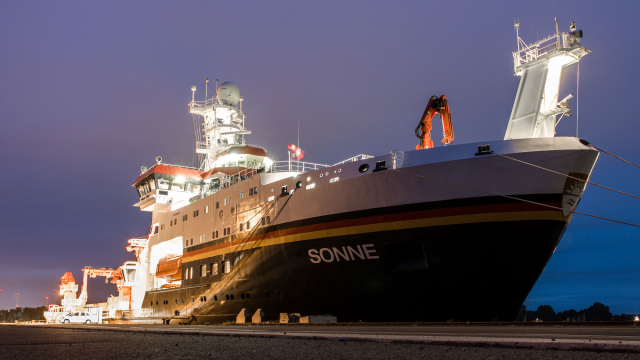02/01/2024 | On January 7, 2024, the German research vessel SONNE will set sail from Port Louis on Mauritius for a six-week expedition to a so-called oxygen minimum zone (OMZ) in the northern Indian Ocean, the Arabian Sea. The first task is to recover measuring instruments that were deployed there in 2001. The journey then continues with the RV SONNE to the Pakistani port city of Karachi to take colleagues from the National Institute of Oceanography (NIO) in Pakistan on board. Together with an international research team from the Leibniz Centre for Tropical Marine Research (ZMT), the University of Hamburg, the NIO and five other German universities and research institutions, the research vessel will then head for the most intensive area of the OMZ to collect current data. The question is: How is the OMZ developing under the conditions of climate change? And what threat does it pose to the coasts of Pakistan and India?
Oxygen minimum zones like those in the Arabian Sea also exist in the Bay of Bengal and the eastern tropical Pacific. These zones, in which the ocean loses almost all of its oxygen, are the result of complex interlocking and interacting physical-oceanographic and biological processes. The OMZ in the Arabian Sea aroused scientific interest early on and became the target of the first major oceanographic expeditions at the beginning of the 20th century. In the 1960s and 1990s, major international research programmes were dedicated to this zone, such as the International Indian Ocean Expedition and the Joint Global Ocean Study.
Since then, piracy around the horn of Africa has hampered further research into the OMZ - with the result that valuable long-term observation data is now lacking. Nevertheless, data was collected again in 2007 during one of the few research trips to the region involving the ZMT. "They showed us that the core area of the OMZ had increased by around 60 percent compared to the situation in the 1990s," explains biochemist Tim Rixen, head of the Carbon and Nutrient Cycling working group at the ZMT. After another 17 years without further observation data, the safety situation has now eased. In January 2024, the ZMT research team under Rixen's leadership will finally be able to start the long-awaited expedition, which will be coordinated by colleagues from the University of Hamburg.
"We lack data from crucial years - years in which climate change could have fuelled the situation. The global climate models do not provide any clear information on this," says Rixen. "The current state of research on the oxygen minimum zone in the Arabian Sea, which we summarized with an international team in 2020, leaves questions about current developments unanswered." However, observations on coasts suggest that the OMZ has expanded further and is increasingly threatening marine coastal ecosystems. "Fish, for example, are literally being deprived of the air they breathe due to the intensification of the OMZ," says the researcher.





